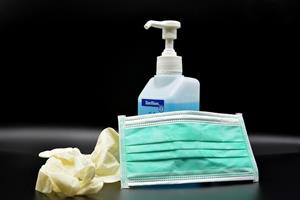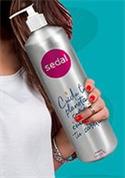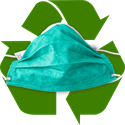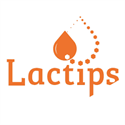CORPORATE ACTION
Will Coronavirus Stall Efforts To Reduce Plastic Use?
 A series of recent changes are rolling back limitations on single-use plastic, especially for plastic bags.
A series of recent changes are rolling back limitations on single-use plastic, especially for plastic bags.The UK suspended the plastic bag charge for online deliveries, Maine voted to delay its bag ban, as did New York State. Some authorities are even moving to ban reusable bags – Massachusetts banned reusable bags during the outbreak and ordered retail stores to use single-use paper or plastic bags and New Hampshire issued a similar emergency order. Various fast food and retail chains, such as Starbucks, have banned the use of reusable cups and food containers. The WSJ reports that some recycling programs are being suspended because of concerns about the virus spreading and asks whether some of these “temporary” changes could be lasting.
Some analysts even expect an uptick in the demand for plastic. Wood Mackenzie, for example, says that tighter packaging regulations in China to deal with coronavirus will likely increase demand for plastic flexible packaging.
These changes are driven by concerns that non-reusable products are safer and could limit spread of the virus. However, there is as yet little evidence to support this view.
A little digging suggests many of these changes are the result of an opportunistic and coordinated effort by the plastics industry to use the coronavirus crisis as a pretext to hold back limitations on plastic use.
On February 28 in a post, the Competitive Enterprise Institute asked “Whether reusable bags could become a significant carrier of the coronavirus remains to be seen, but there are good reasons to fear they will harbor other equally dangerous bacteria and viruses transmitted from carrying meat and produce. Coronavirus aside, we know for sure that pathogens like E. coli are serious and can be deadly”.
On March 12, in a piece called “Greening Our Way to Infection’ in City Journal, John Tierney said “…reusable tote bags can sustain the Covid-19 and flu viruses—and spread the viruses throughout the store.”
On March 25, an article in Plastics Today said “…plastic retail bags have been determined to be an important tool in helping to stop the spread of COVID-19.”
Additional useful coverage on this is in Mother Jones and The Guardian.
While concerns about the coronavirus look likely to provide a reprieve for manufacturers of some plastic items, our sense is that gains will be temporary. Consumers remain angry about plastics. They’ll accept greater use of disposable items for a while, but their preference for more sustainable and non-plastic items will endure long after coronavirus is beat.[Image Credit: © KlausHausmann ]
CORPORATE ACTION: Coca-Cola
Coca-Cola Japan Eliminates Labels From Multi-Pack Bottles Of I Lohas Water
 Coca-Cola Japan this month is switching to new bottle designs for its market leading “clear beverages” brand I Lohas water that eliminate labels, are made from 100 percent recycled plastic, and retain the malleability that makes them easy to crush into compact recyclable sizes. The new label-free bottle designs will be sold in cases displaying nutritional information, etc., of 24 for $26) at supermarkets, drug stores, and online retailers. Bottles sold separately will still have the label.[Image Credit: © Coca-Cola (Japan) Company, Limited]
Coca-Cola Japan this month is switching to new bottle designs for its market leading “clear beverages” brand I Lohas water that eliminate labels, are made from 100 percent recycled plastic, and retain the malleability that makes them easy to crush into compact recyclable sizes. The new label-free bottle designs will be sold in cases displaying nutritional information, etc., of 24 for $26) at supermarkets, drug stores, and online retailers. Bottles sold separately will still have the label.[Image Credit: © Coca-Cola (Japan) Company, Limited]
CORPORATE ACTION: Henkel
Expected GLYMO Legislation In Europe Led Henkel To Develop New Adhesion Promoters For Packaging
 Epoxy silanes, such as GLYMO and GLYEO, are used in food packaging, for example for hot-fill uses and microwaveable products. They promote and maintain adhesion between aluminum and polyolefin films, even at higher temperatures. In 2017, the European Food Safety Authority found that GLYMO has “a genotoxic potential” and is working on legislation, expected later this year, to regulate the use of epoxy silanes according to their genotoxic potential. The Association of the European Adhesive & Sealant Industry already recommends they are replaced as soon as possible.
Epoxy silanes, such as GLYMO and GLYEO, are used in food packaging, for example for hot-fill uses and microwaveable products. They promote and maintain adhesion between aluminum and polyolefin films, even at higher temperatures. In 2017, the European Food Safety Authority found that GLYMO has “a genotoxic potential” and is working on legislation, expected later this year, to regulate the use of epoxy silanes according to their genotoxic potential. The Association of the European Adhesive & Sealant Industry already recommends they are replaced as soon as possible.Henkel announced that it has developed laminating adhesives containing no epoxy silanes, as well as a way to identify epoxy silanes in packaging. Henkel’s new solution contains the adhesive base Loctite Liofol LA 2798, to be combined with hardeners. The company currently makes four hardeners, suitable for different applications. Henkel says the new adhesion promotion systems have been tested by several of its customers.[Image Credit: © Henkel]
CORPORATE ACTION: Unilever
Unilever Says Its Sedal Shampoo Refilleries Trial Is A Great Success. Will Go National
 Last year, Unilever set up refill stations in ten Walmart stores across Mexico where consumers could fill up resuable aluminium bottles with Sedal shampoo. Consumers had to purchase the bottle but could then refill the container at a lower cost than purchasing a similar sized plastic container. Unilever says “reaction from consumers so far has been extremely positive”. The company added that in the first ten days its refilleries sold two tons of Sedal shampoo, and that demand remained pretty much constant through the trial. Unilever says that it plans to roll it out across the country.
Last year, Unilever set up refill stations in ten Walmart stores across Mexico where consumers could fill up resuable aluminium bottles with Sedal shampoo. Consumers had to purchase the bottle but could then refill the container at a lower cost than purchasing a similar sized plastic container. Unilever says “reaction from consumers so far has been extremely positive”. The company added that in the first ten days its refilleries sold two tons of Sedal shampoo, and that demand remained pretty much constant through the trial. Unilever says that it plans to roll it out across the country.
CONSUMER & PUBLIC OPINION
A New Survey Highlights Consumer Confusion Over Recycling, And CPG “Virtue-Signaling”
In language that mirrors our stance on this, the article says CPG companies appear satisfied with promises of more recyclability, biodegradability or compostability, but the claims on the labels are often merely virtue-signaling, to provide consumers with a “feel-good” experience. Hi-Cone says it ismisleading to say plastic packaging is compostable in the knowledge that commercial infrastructure does not exist to make it so, and claims of biodegradability might encourage people to dispose of plastic in the expectation that nature will get rid of it, which it won’t.
Hi-Cone’s Shawn Welch calls for a more transparent process and clearer consumer guidance, but also warns about the risk of trying to solve the plastic crisis at the cost of replacing it with a larger problem, such as using materials that have an even more damaging environmental impact.[Image Credit: © Hi-Cone]
MARKET NEWS
TerraCycle’s CEO Says The Loop Platform Is A More Circular Disposal Model For Beauty
 In a video interview, Tom Szaky, TerraCycle’s CEO, said the Beauty industry is “attacking single-use plastic”, and that at least is encouraging. He highlighted the need for manufacturers to explore how best to make packaging recyclable, how to use recycled content, and how to adopt a more reusable (“we-refill-for-you”) model, which is the basis for the Terracyle-led Loop platform. He says Loop still plays to the consumer culture consumers want, but instead of single-use packaging, Terracycle takes it away and refills it for them.[Image Credit: © TerraCycle]
In a video interview, Tom Szaky, TerraCycle’s CEO, said the Beauty industry is “attacking single-use plastic”, and that at least is encouraging. He highlighted the need for manufacturers to explore how best to make packaging recyclable, how to use recycled content, and how to adopt a more reusable (“we-refill-for-you”) model, which is the basis for the Terracyle-led Loop platform. He says Loop still plays to the consumer culture consumers want, but instead of single-use packaging, Terracycle takes it away and refills it for them.[Image Credit: © TerraCycle]
Coronavirus Impacts Recycling In Europe
 Coronavirus is negatively impacting European recycling markets on a number of levels and may cause long-term impairment. Since around mid-March volumes entering collections systems are significantly down and processing is sometimes disrupted through absent staff and logistics problems. Users of recycled plastics express concern that they will not be able to secure the volumes they need.
Coronavirus is negatively impacting European recycling markets on a number of levels and may cause long-term impairment. Since around mid-March volumes entering collections systems are significantly down and processing is sometimes disrupted through absent staff and logistics problems. Users of recycled plastics express concern that they will not be able to secure the volumes they need.At the same time, the fall in oil prices means virgin plastic is cheaper than most recycled plastics, such as for food grade RPET flakes, RHDPE and RPP. Commentators fear that investment in recycling capacity will be delayed or cancelled, impacting the long-term potential of the industry.[Image Credit: © Public Domain]
POLICY, REGULATION & LEGAL
The European Plastics Pact Aims To Facilitate A European Circular Economy
These measures largely pattern other voluntary codes that signal virtue to consumers but are unlikely to bring substantive change. Our previous analysis, for example, shows that meeting the New Plastic Economy targets, which are similar, will still allow a large increase in virgin plastic use.[Image Credit: © European Plastics Pact]
INNOVATION & TECHNOLOGY
French Company Lactips Has Developed A Plastic Substitute From Cow’s Milk
 Lactips, a French company founded in 2014, has developed pellets from cow’s milk protein (casein) that can substitute for plastic in packaging for household care products. It is also edible and could potentially be used to package food. The company says the pellets are fully biodegradable and water-soluble, making them suitable for dishwasher tablets and single-dose detergents. Lactips is also working on a recovery model to use dairy products unfit for consumption (such as date-expired yoghurt).[Image Credit: © Lactips]
Lactips, a French company founded in 2014, has developed pellets from cow’s milk protein (casein) that can substitute for plastic in packaging for household care products. It is also edible and could potentially be used to package food. The company says the pellets are fully biodegradable and water-soluble, making them suitable for dishwasher tablets and single-dose detergents. Lactips is also working on a recovery model to use dairy products unfit for consumption (such as date-expired yoghurt).[Image Credit: © Lactips]
Waitrose And Cuan Tec Aim To Make Flexible Film For Food Packaging From Langoustine Shells
Carbios Develops A Novel Enzyme To Accelerate And Improve Yield From PET Depolymerization
 Carbios, a French company focused on lifecycle solutions for plastic and textile polymers, has published an article in the scientific journal Nature, co-authored by the Toulouse Biotechnology Institute, in which it discusses a novel enzyme to depolymerize biologically polyethylene terephthalate (PET) plastic waste into monomers, which can then be used for new PET bottles. It has found a way to improve the degradation yield of PET waste, to 90% in 10 hours, up from just 1% after several weeks.
Carbios, a French company focused on lifecycle solutions for plastic and textile polymers, has published an article in the scientific journal Nature, co-authored by the Toulouse Biotechnology Institute, in which it discusses a novel enzyme to depolymerize biologically polyethylene terephthalate (PET) plastic waste into monomers, which can then be used for new PET bottles. It has found a way to improve the degradation yield of PET waste, to 90% in 10 hours, up from just 1% after several weeks.A Suntory press release announced that the Ribena, Lucozade Energy and Lucozade Sport brands will be the first in the UK to use the new 100% sustainable plastic.
[Image Credit: © Caribos]
Copyright 2026 Business360, Inc.

